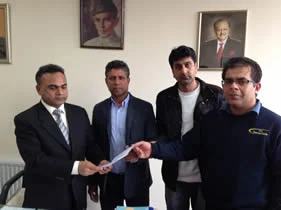Introduction
In the heart of April 2014, a clarion call echoed from the valleys of Gilgit Baltistan to the bustling streets of Bradford. The Jammu Kashmir National Independence Alliance (JKNIA), a coalition of fervent advocates for Kashmiri self-determination, extended their unwavering support to the Awami Action Committee Gilgit Baltistan’s (AACGB) “Charter of Demand.” This charter, a testament to the aspirations of the people of Gilgit Baltistan, sought recognition and respect from the highest echelons of Pakistan’s leadership.
A Memorandum of Solidarity
On April 25, 2014, a delegation led by Mahmood Kashmiri, Chairman of JKNIA, delivered a memorandum to the Consul General of Pakistan in Bradford. This document, endorsed by prominent figures such as Ghulam Hussain of the Kashmir Freedom Movement (KFM), Ershad Malik of the Jammu Kashmir Democratic Freedom Party (JKDFP), and others, expressed unequivocal support for the AACGB’s demands. The memorandum underscored the solidarity of the Kashmiri diaspora in the UK and Europe with the people of Gilgit Baltistan, fully endorsing their quest for rights and recognition.
A Peaceful Protest Met with Silence
Since April 15, 2014, citizens from every corner of Gilgit Baltistan had engaged in peaceful sit-ins, voicing their demands through non-violent means. Yet, the Pakistani establishment’s response was one of indifference. The memorandum lamented this apathy, highlighting the government’s failure to address the legitimate aspirations of its people. Such negligence, it argued, was a violation of civil and political rights, drawing attention from international bodies like the European Union, which had previously urged Pakistan to revisit its policies regarding Gilgit Baltistan and Azad Jammu Kashmir.
Rejecting Colonial Legacies
The leaders of JKNIA denounced the Karachi Agreement of 1949, labeling it a draconian colonial mechanism that perpetuated subjugation. They called for its unequivocal rejection, emphasizing the need for equitable relations between Pakistan and the semi-autonomous regions of the former state of Jammu and Kashmir. Ghulam Hussain, President of KFM, voiced deep anguish over the government’s insensitivity, urging immediate action to rectify longstanding grievances.
Demands for Justice and Recognition
The memorandum presented three pivotal demands to Prime Minister Nawaz Sharif:
- Immediate acceptance of the AACGB’s “Charter of Demand” in its entirety.
- Respect and implementation of UN mechanisms, as outlined in Security Council and UNCIP resolutions, in Gilgit Baltistan.
- Engagement in meaningful dialogue with representatives from Gilgit Baltistan and Azad Jammu Kashmir to renegotiate governance arrangements, ensuring equitable relations during the interim period.
A Call to Uphold Democratic Values
In its concluding remarks, the memorandum challenged the Pakistani government to demonstrate its commitment to democratic principles and its role as a responsible member of the international community. The JKNIA awaited positive action, hoping for the protection of fundamental rights and the establishment of a decentralized system of governance that truly represented the will of the people.


